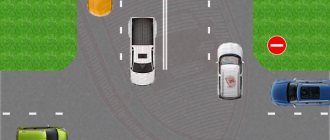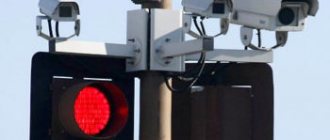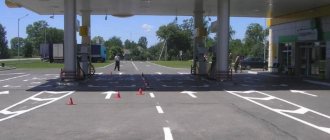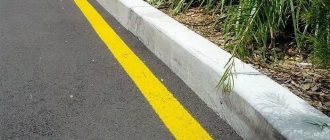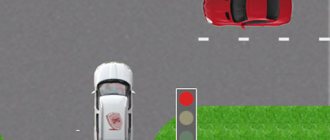Is there a penalty for toll roads in 2021?
No. Today, this is exactly the situation where there is a legal requirement, but there is no responsibility. In particular, this is not just one such violation; there are a number of similar ones. Let's look at these cases:
- as we found out above, there is no fine for traveling without paying on a toll road,
- There is also no punishment for dangerous driving, although there is a fairly clear definition of it in the traffic rules,
- Also, the Rules prohibit exceeding the speed by even 1 km/h, however, there is also no liability for exceeding up to 20 km/h,
- There are many more similar violations (prohibited reversing, creating a danger on the road, choosing a speed that does not correspond to weather and road conditions, and others).
If a traffic police inspector tries to fine you on the road for unpaid travel on a toll section of a highway or other road, then this is a fraud. Perhaps the employee will indicate in the resolution another violated article (for example, driving through a red traffic light - which, by the way, is installed with a barrier at the toll collection point). Therefore, carefully read the resolution before signing and appeal.
You will also be interested in:
- What new traffic police fines for speeding have come into force?
- The new law on the nullification of traffic police fines - is it true or not?
- New fines for abandoning a car in the yard and for washing a car - true or not?
But there is one traffic police trap!
However, we have already indicated its essence in the sentence above. It lies in the fact that almost all points for accepting payment for travel by “scarf” are currently equipped with manual collection of payment. That is, the cashier sits and takes your payment. This happens on the M4, M5, M11 and many other sections.
So, such a point is most often equipped with a barrier, and the possibility of passage is regulated by a red and green signal, which mean the same thing as traffic light signals.
The trap of the traffic police is that immediately behind such a point there is a traffic police squad that catches drivers who decide to drive through the barrier without paying and fines them... For driving through a prohibitory traffic light.
This is, of course, illegal, and there are 3 reasons for this:
- firstly, the traffic rules clearly establish (clause 6.7) that traffic lights with a cross and an arrow are reversible, and they regulate traffic on roads where lanes change to passing and oncoming lanes; exactly the same signals are used on toll roads, but there cannot be an oncoming lane when passing through a payment acceptance point,
- secondly, and this is the main thing, GOST 33385-2015 defines that a traffic light is a device that regulates the order of traffic, and not the possibility of passage,
- and thirdly, GOST R 52282-2004 contains a whole series of requirements for such elements of the road network, which makes it completely illegal to call signals for the possibility of passing through a toll road point a traffic light.
Fine for driving on a toll road without paying: article of the Code of Administrative Offenses of the Russian Federation
The Code of Administrative Offenses of the Russian Federation is supplemented by Article 12.21.4, which establishes two types of administrative punishment.
- Drivers of passenger vehicles - a fine of 1,500 rubles.
- Drivers of trucks and buses – a fine of 5,000 rubles.
The introduction of these amendments is connected with the upcoming opening of “barrier-free payment” points on the Moscow ring road, where the toll will be written off automatically or the fee can be paid in advance.
Until now, there was no separate sanction that made it possible to fine “hares”. Those who “rammed” toll booths on federal highways were charged with related charges, such as running a red light (by the way, a repeated violation can lead to deprivation of your license!) or for leaving the scene of an accident in case of damage to the barrier.
IMPORTANT: For committing an offense multiple times per day, the driver (more precisely, the owner) of a single car can be fined only twice per day.
What prohibits you from riding for free?
Alas, the arguments of some motorists that there is no obligation to pay for travel on roads in Russia are groundless, because the Constitution itself prescribes freedom of movement.
Indeed, such an obligation is not spelled out in the traffic rules. However, drivers are required to be guided not only by these regulations, which, by the way, are not laws and have a lower priority for execution, unlike the latter.
But the very possibility of toll roads and the obligation to pay for travel on them are established by 2 legal acts:
- Federal Law on Highways (Article 40, in particular),
- Decree of the Government of the Russian Federation No. 18 issued in pursuance of this law.
What other consequences could there be?
Internet users also talk about other consequences of careless or thoughtless actions when entering toll roads. Most often, these are additional financial expenses incurred to restore a broken structure. But there are also more serious consequences when drivers who have disappeared are deprived of their license for some period.
Of course, lawyers say that such court decisions can be appealed. But, you see, the lost time and frayed nerves are not worth it. After all, for some, a vehicle is the only means of earning money. Therefore, you should be more careful on the roads. And if you don’t want to use paid services on principle, then it’s better not to create unnecessary problems for yourself.
What is this new law?
So, above we mentioned the new traffic police fine for trying to drive freely on a toll section of the road. As of 2021, it has not been introduced and does not have legal force, so the information about the absence of punishment for non-payment is indeed still relevant. But everything could change if a new law is passed.
We are talking about the draft Federal Law on the introduction of a corresponding article into the Code of Administrative Offenses of the Russian Federation, which directly provides for a new fine for a toll road in the amount of 2,500 to 5,500 rubles.
While the new law is under consideration and has not been adopted, this fine cannot be called valid - traffic police officers cannot legally punish drivers. However, the fact that it has already been adopted at least in the first reading speaks volumes - there is a high probability of its coming into force.
What lawyers say
If a driver breaks a barrier on a toll road, then he bears, first of all, administrative responsibility.
The Code of the Russian Federation on Administrative Offenses provides for Article 12.33 “Damage to roads, railroad crossings or other road structures.” Since barriers are classified as road structures, this article applies to all the situations described above.
A broken road barrier poses a threat to the safety of movement on the road, and in some cases this situation is a deliberate obstacle to traffic. Article 12.33 provides for the following amounts of penalties in cases of damage to road structures:
- for individuals the fine is one thousand five hundred rubles
- for officials the fine will be five thousand rubles
- for legal entities the amount can reach two hundred thousand rubles depending on the severity of the damage caused
What is the fine?
The new sanction will be regulated by a change in the Administrative Code - the newly introduced Article 12.244, which will provide for punishment in the following amounts:
- a new traffic police fine in the amount of 2,500 rubles for driving without payment on a toll road or along a toll section for the owner of a car or a foreign driver of a car,
- and if we are talking about a truck, then the amount will be 5,500 rubles (either the owner of the truck - a Russian, or its foreign driver - is also fined).
Please note that there is no clear division between trucks and cars based on the permitted maximum weight of 3.5 tons, which is common in Russian legislation. It's just about the type of car. Thus, owners of, for example, Gazelles and other vehicles whose weight does not exceed 3,500 kilograms, but which are intended for transporting goods, will be issued a fine for the camera in the maximum amount - 5.5 thousand rubles.
How will they be punished?
The note to this article in the new law directly states that the possibility of recording payment violations on toll roads is provided only in automatic mode. That is, no traffic police officer has the right to issue a fine under the new article 12.244; you can only receive “chain letters” from cameras.
What happens if you knock down the barrier and drive away?
The financial consequences will directly depend on the scale of damage to someone else’s property, that is, the amount of damage caused is determined on an individual basis.
If the driver left the scene of the accident and was discovered by the traffic police later, he will be deprived of the right to drive a vehicle for a long period (up to one and a half years) or will spend some time under arrest.
In addition, he will have to pay a fine of up to 10,000 rubles if the barrier turns out to be an element of the city infrastructure that ensures road traffic.
Is it possible and how to avoid responsibility?
It is worth noting separately the main feature of the enforcement of the new fine for free travel on a toll section of the highway, which is provided for in Note No. 1 in the 2021 draft law.
Let's quote it literally:
Fulfillment by a person brought to administrative responsibility of the obligation to pay the toll for travel of a vehicle on toll roads, toll sections of highways before the expiration of the period provided for in Article 32.2 of this Code is the basis for release from administrative liability and termination of proceedings in the case of an administrative offense .
We see a reference to Article 32.2 of the Code of Administrative Offenses of the Russian Federation, which deals with the execution of punishment - that is, the payment of a fine to the traffic police. But only the payment period is mentioned - not the fine, but directly for travel along the “scarf”, and in this case both of these terms are equal - 60 days.
Thus, you can legally avoid a fine for free travel on a toll road only by paying for the toll within 60 days after the violation occurred.
This is the magnificent relaxation that legislators have provided. However, the question of how auto-recording cameras will issue fines remains very unclear. They will either have to be taught to check whether the driver has paid for travel on the toll highway later, or the fine itself for non-payment will be issued only after 60 days.
Something else useful for you:
- New fines in July 2021 - is it true?
- New fines from February and January 20, 2021 - true or not?
- New traffic police fines from September 1st to 20th - true or false?
Penalty passage
So, the first section of the Central Ring Road, where the “Free Flow” system began operating, allowing you to drive along the highway without stopping to pay, has been put into operation. There are three toll gates installed along a 105-kilometer stretch. Those drivers who have a transponder installed on their cars have nothing to worry about. The payment is automatically debited from your personal account using it.
However, problems may arise for those whose cars have athermal glass installed. The signal does not pass through them. If previously, when approaching a barrier, drivers of such cars simply stuck their hand with a transponder out of the window, then during “free passage” they will have to know exactly the location of the frames.
Although, as Avtodor reported, transponders designed specifically for athermal glass will soon appear.
Those who do not have transponders can purchase a ticket in advance before the trip. This can be done through the mobile application on the official website avtodor-tr.ru, as well as through self-service terminals.
You can pay for travel later - within five days after travel. To do this, you can use the same services.
If the debt for travel to a toll section is not repaid within 20 days, you will have to pay both it and the fine in full
Not only transponder reading antennas are located on the toll collection area. There are cameras installed there that record traffic, read registration numbers both front and rear, and also count the number of axles. Laser sensors are also installed that determine the dimensions of the machine. All information about cars without transponders is transmitted to the central traffic control center. Here they monitor everything that happens on the operating section of the Central Ring Road. If the automation fails to read the number, the operator will try to recognize it himself.
If the fare is not paid within five days after the journey, information about such a car from the central control point will be sent to Rostransnadzor to issue a fine.
From the moment you receive a copy of the decision by mail, the car owner will have 10 days to appeal the fine. And another 60 days to pay the fine. In the original draft amendments to the Code of Administrative Offences, the fine for cars was 2.5 thousand rubles, for trucks and buses - 5.5 thousand. At the same time, the car owner had the opportunity to pay off the debt and get rid of the fine within these 70 days. But in the revised draft, the fines were reduced. For cars - up to 1.5 thousand rubles, for trucks and buses - up to 5 thousand. In this case, the debt can be repaid within 20 days. If it is not repaid within this period, then you will have to pay both the travel and the fine in full without discounts, because the 20-day period will expire.
In this case, the fine can be imposed once per day. If a driver uses a toll road several times a day and does not pay for the toll, he will receive one fine.
The state does not have access to data about who the car is registered to, as well as the right to receive it, so fines will be issued by Rostransnadzor.
However, Rostransnadzor will be able to do this when the corresponding amendments to the Code of Administrative Offenses are adopted and come into force. Currently, the code does not provide for a fine for unpaid travel on a toll plaza.
The inability of the state company to obtain data on car owners makes it impossible to issue demands for payment to “hares.” To whom should these demands be made? At the same time, information about debtors will accumulate. But the company is confident that those who regularly use this road will pay the toll.
It is noteworthy that when the amendments to the Code of Administrative Offenses are adopted, those who traveled without paying for travel until that moment will not be held accountable. The law does not have retroactive effect. So, until the code is changed, we can only rely on the honesty of motorists.
By the way, when the Central Ring Road first started operating, some honest motorists tried to post-pay their fare, but they did not find information on how to pay in the system. As the state company explained, this could happen while the systems were being debugged. Now everything is working fine, and the system has information about each vehicle that has passed.
When will it take effect?
This is not yet known. As of the date of writing, the bill has only been adopted in the first reading by the State Duma. We need 2 more stages of readings, in which the new law will either be adopted or rejected, and then it will not come into force at all, and also (if it is adopted in all 3 readings) by signing by the President of the Russian Federation, approval by the Federation Council and official publication with a deadline at least 10 days after that.
You can see for yourself the current status of the project today on the official website of the Duma, and also check it and all other new laws in our timeline of changes to Russian traffic legislation.




